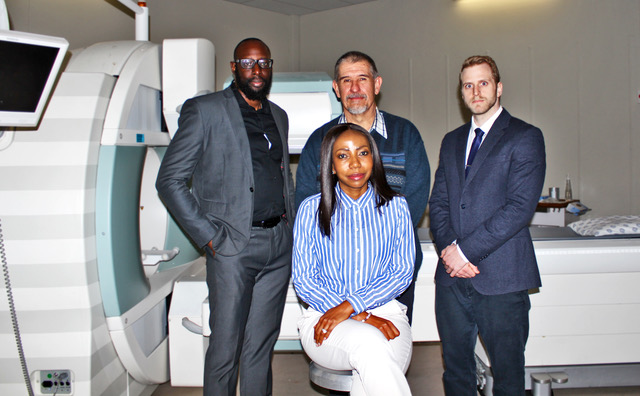The University of the Free State (UFS) Department of Nuclear Medicine is proud to announce the successful treatment outcome of a patient with metastatic castrate-resistant prostate cancer (MCRPC) – an advanced stage of prostate cancer – by using Lutetium 177 PSMA (Lu-177 PSMA) therapy. This was initially a case of advanced stage prostate cancer, which had failed first-line chemotherapy, leaving little or no other treatment options.
The UFS, which started this treatment just more than a year ago, and the Free State Province are now joining other South African medical universities, such as the University of Pretoria, in using this method to treat MCRPC patients. Lutetium 177 PSMA (Lu-177 PSMA) therapy is used on MCRPC patients who are not eligible for chemotherapy or have failed first- or second-line chemotherapy. So far, three patients have been offered this therapeutic option, with the third patient currently undergoing his treatment.
Dr Gerrit Engelbrecht, clinical head of the Department of Nuclear Medicine at the UFS, says the department is proud to be able to offer this treatment option to some of these patients. “It is a big win for the Free State and our oncology patients to be able to offer these expert services.”
The UFS and Universitas Academic Hospital are linking up with other academic institutions and hospitals in other provinces to offer these services.
Funds needed
The expertise is no longer an issue for the UFS, as Dr Osayande Evbuomwan, nuclear medicine specialist and consultant, was trained and exposed to this therapy at the University of the Witwatersrand during his training as a nuclear medicine resident. Current registrars in the Department of Nuclear Medicine at the UFS are also being trained in the application of this treatment modality.
However, proper patient selection is key in the management of these cases with Lu 177 PSMA. Without a PET/CT camera, it is challenging to appropriately select the patients most likely to respond to this therapy. This is an example of how PET/CT is crucial in the management and monitoring of oncology patients.
Both Engelbrecht and Evbuomwan hope that the training of more registrars will increase their department’s capacity to treat more patients. They also hope that funds will be made available to acquire a much-needed PET/CT camera, which will greatly assist them in identifying the correct patients in need of this treatment.
Treatment puts the department, UFS and hospital on the map
Evbuomwan says the ability to administer this treatment puts the department, the UFS and the hospital on the map, alongside other top universities within and outside the country. “It also creates an avenue for us to gather data for training, research purposes and publications. We are now able to offer a promising, safe and highly efficacious therapy for patients with MCRPC in the Free State. Some of these patients will no longer have to travel to other provinces to receive this treatment.
“We are well aware that not every patient will respond this way, however, proper patient selection is key in identifying responders – an area that is still being researched. We also do not know how long these patients will have their disease under control after the treatment. Nuclear medicine’s greatest cancer therapy success story is the treatment of well-differentiated thyroid cancer with radioactive iodine.
“After treatment, most of these patients remain cancer-free for a very long time, if not for life. With continuing research in the field of MCRPC radioligand therapy, we aim to improve the treatment modality, hopefully getting it to the success level of thyroid cancer therapy.”
Pictured below is the team from the Department of Nuclear Medicine: from the left (standing): Dr Osayande Evbuomwan, nuclear medicine specialist and Senior Lecturer; Dr Gerrit Engelbrecht, Clinical Head of the Department of Nuclear Medicine at the UFS; and Dr Walter Endres, nuclear medicine registrar. In front is Dr Tebatso Tebeila, nuclear medicine registrar.

Issued by UFS
